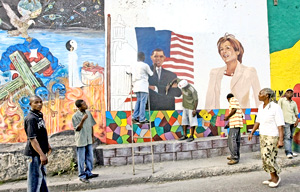JIM.LOBE
WASHINGTON (IPS/GIN) – International donors have pledged $324 million over the next two years in additional aid to help Haiti recover from food riots and damage to roads and other key infrastructure caused by four hurricanes that ravaged Latin America’s poorest nation last summer.

The commitments were made during an all-day, all-star meeting April 15 that featured former President Bill Clinton, his wife and current secretary of state, Hillary Clinton, UN Secretary-General Ban Ki-moon, and the heads of the World Bank and International Monetary Fund, among others, at the headquarters of the Inter-American Development Bank.
The new commitments, including $41 million to reduce the government’s anticipated deficit this year, came amid growing concern that Haiti’s economy faces daunting challenges not only in recovering from the hurricanes that effectively erased 15 percent of its gross domestic product last year, but also in coping with the global financial crisis which, among other effects, has reduced remittances to Haiti from the United States
For the first time in several decades, the economy’s growth in 2007–3.4 percent–exceeded the increase in its population. But the hurricanes, which hit the country’s third-largest city, Gonaives, particularly hard, more than reversed the advances of the previous year. Losses were estimated at some $1 billion, while more than 800 people were killed by the flooding and tens of thousands were displaced from their homes.
“Haiti’s economy was beginning to show the first signs of a turnaround,” noted World Bank President Robert Zoellick, who visited Haiti shortly after the storms, “but the results haven’t yet reached critical mass or visibility. Now, set back once again by global recession, there is a real danger that we fail to seize the moment of Haiti’s promise,” he noted, adding, “long-term ‘Haiti fatigue’ may prove more devastating to the country’s future than natural disasters.”
In March, the Brussels-based International Crisis Group warned that serious instability could ensue if donors failed to sharply increase their assistance in the wake of last April’s food riots, which resulted in the ouster of the then-Prime Minister Jacques-Edouard Alexis, and the following summer’s hurricanes.
“The socio-economic situation is worse than at the time of the April 2008 riots and the fall of the Alexis government,” said Bernice Robertson, the group’s senior Haiti expert, when the report was released in early March.
“We are treading on very fragile ground,” declared Haiti’s new prime minister, Michele Duvivier-Louis, during the opening session of the April 15 meeting. “If no action is taken now the consequences will be catastrophic.”
Haiti’s urban areas, she noted, were filled “with unemployed young men and women whose future looks absolutely grim.”
Mrs. Clinton said Washington will provide $287 million in non-emergency aid to Haiti this year, most of which will be devoted to infrastructure, agricultural development, debt relief, and security, which, despite the natural disasters, has improved sharply over the last several years due largely to the efforts of the Brazilian-led UN 9,000-strong peacekeeping force, MINUSTAH.
In addition to aid, Washington has provided Haiti with duty- and quota-free treatment to Haitian garment exports guaranteed over 10 years under its Haitian Hemispheric Opportunity through Partnership Encouragement Act of 2006. The United States is Haiti’s biggest bilateral donor, although Canada, France, and Japan–all of which sent senior officials to the conference–have also provided hundreds of millions of dollars in aid in recent years.
Related links:
- Helping Haiti may turn on ‘affirmative engagement’ (FCN, 04-22-2009)
- One-on-One Interview with Haitian activist Noluthando Williams (FCN, 11-15-2007)
- Haiti represents more than chronic poverty (FCN, 11-15-2007)












